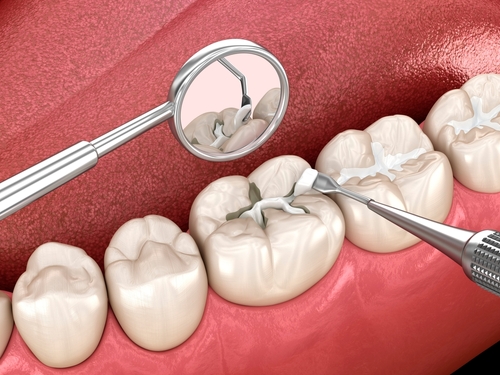Are you seeking a dental restoration that combines durability, aesthetics, and natural charm? Look no further than composite fillings from Buck Family Dentistry. Dr. Buck, one of the best dentists in Creston, IA, takes pride in transforming ordinary smiles into extraordinary masterpieces. Get ready to discover a new level of dental excellence that will leave you beaming with confidence and joy!
Composite Fillings in Creston, IA
What Are Composite Fillings?
Composite fillings, also known as tooth-colored fillings, repair teeth damaged by decay, cracks, or fractures. These fillings are made of a mixture (composite) of plastic resins and finely ground glass particles. The material used in composite fillings can be closely matched to the color of the natural teeth, making them an aesthetically pleasing option for dental repairs.


Benefits of Composite Fillings
There are several benefits of composite dental fillings, such as:
- Natural Appearance: Composite fillings can be color-matched to the existing teeth, making them virtually indistinguishable from the surrounding enamel. This ensures a more natural appearance for dental restorations.
- Versatility: Composite fillings can repair both front and back teeth, offering versatility in treating various dental cavities and defects.
- Bonding Strength: These fillings chemically bond to the tooth structure, providing additional support and helping to prevent fractures and further damage.
- Conservative Restoration: To place a composite filling, the dentist only needs to remove the decayed or damaged portion of the tooth, preserving more of the healthy tooth structure than amalgam fillings.
- Mercury-Free: Unlike amalgam fillings, composite fillings do not contain any mercury, addressing concerns about potential health risks.
What Can Composite Fillings Fix?
Composite fillings are effective in treating a range of dental issues, including:
- Cavities: Composite fillings fill cavities caused by tooth decay, restoring the tooth’s function and preventing further decay.
- Chips and Fractures: They can repair chipped or fractured teeth, restoring their shape and strength.
- Worn Teeth: Composite fillings can rebuild worn-down teeth, restoring their normal function and appearance.
- Gaps: In some cases, composite fillings can be used to close small gaps or spaces between teeth, improving the overall appearance of the smile.

